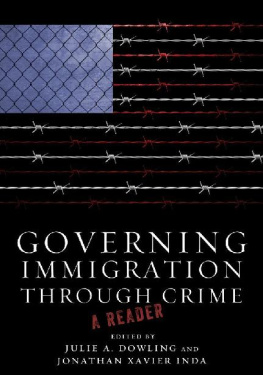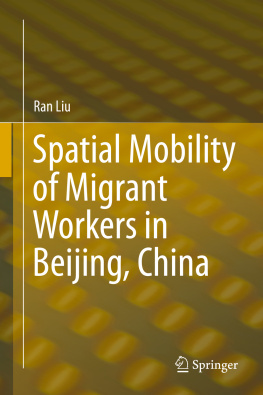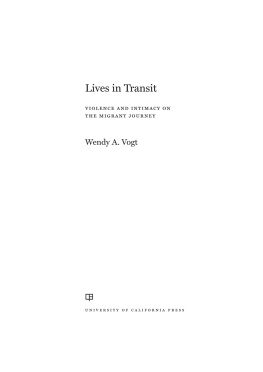Inequality at Work
Enobong Hannah Branch, Series Editor
Inequality at Work: Perspectives on Race, Gender, Class, and Labor provides a platform for cultivating and disseminating scholarship that deepens our knowledge of the social understandings and implications of work, particularly scholarship that joins empirical investigations with social analysis, cultural critique, and historical perspectives. We are especially interested in books that center on the experiences of marginalized workers, that explore the mechanisms (e.g., state or organizational policy) that cause occupational inequality to grow and become entrenched over time, that show us how workers make sense of and articulate their constraints as well as resist them, and that have particular timeliness and/or social significance. Prospective topics might include books about migrant labor, rising economic insecurity, enduring gender inequality, public and private sector divisions, glass ceilings (gender limitations at work) and concrete walls (racial limitations at work), or racial/gender identity at work in the Black Lives Matter era.
Library of Congress Cataloging-in-Publication Data
Names: Keller, Julie C., author.
Title: Milking in the shadows : migrants and mobility in Americas dairyland / Julie C. Keller.
Description: New Brunswick : Rutgers University Press, [2019] | Series: Inequality at work | Includes bibliographical references and index.
Identifiers: LCCN 2018012990 | ISBN 9780813596426 (cloth) | ISBN 9780813596419 (pbk.)
Subjects: LCSH: DairyingWisconsin. | Foreign workersWisconsin. | MexicoEmigration and immigration. | United StatesEmigration and immigration.
Classification: LCC HD9275.U63 W64 2019 | DDC 331.5/14409775dc23
LC record available at https://lccn.loc.goc/2018012990
A British Cataloging-in-Publication record for this book is available from the British Library.
Copyright 2019 by Julie C. Keller
All rights reserved
No part of this book may be reproduced or utilized in any form or by any means, electronic or mechanical, or by any information storage and retrieval system, without written permission from the publisher. Please contact Rutgers University Press, 106 Somerset Street, New Brunswick, NJ 08901. The only exception to this prohibition is fair use as defined by U.S. copyright law.
www.rutgersuniversitypress.org
Introduction
On a sunny day in the summer of 2011 in a village in Veracruz, Mexico, that I call Cualtzin, I met the owner of a car repair shop. His name was Yurico, and I had been encouraged to talk with him if I wanted to understand the lives of migrants who had worked on dairy farms in El Norte. I sat in front of an open door facing a small balcony where Yurico stood. He was fifty-six years old, had a friendly demeanor, and was eager to talk. He leaned against the railing in the sun, occasionally looking out at the green valley below that was dotted with houses and small plots of agricultural land. Against the background sounds of his young granddaughters playing in the shop, Yurico told me the story of how he got to Wisconsin.
In search of a better income than he could earn at home working in the fields, Yurico made the journey north in 2004 with a nephew who was returning to a job milking cows in the Upper Midwest. The two took a bus to a border town, and in a group with fifteen others, they began to cross the desert using the services of a coyote. But they were soon spotted by a helicopter and eventually detained by border patrol agents. Ordered into the agents vehicles, they were taken to a detention center, where they were fingerprinted and held for three hours. The group was then taken by bus across the border back to Mexico. They stayed in a hotel to regroup and tried their luck again the next day. After driving two hours by van back toward the border, they set out on foot once more and walked all night through the desert. They eventually reached a highway, where a car met the group of travelers and took them to a secure location. After resting and changing their clothes in a safe house, Yurico and his nephew were driven to Los Angeles, where they booked a flight for Chicago. Once there, they discussed their options for getting to Wisconsin. Yuricos nephew warned that he heard that immigration enforcement agents sometimes boarded buses and demanded identification. Not wanting to take their chances, they hired a taxi instead, paying eight hundred dollars to complete the final leg of their journey and arriving many hours later.
In Wisconsin, Yurico waited one month to find a job on a dairy farm, first harvesting apples with other Mexican workers. He lived in a trailer with another worker, who was from the next village over from Cualtzin. Finally, Yurico secured work through his nephew as a milker on a dairy farm with more than a thousand cows. He lived on the farm in an old house with no stove and without any transportation to buy food. Yurico described to me what his life was like working there: From my job to my room, nothing else... from my job to my room. I was enclosed every day.
Why didnt you leave? I inquired. Yurico responded emphatically, Because I didnt have anything to leave with! I didnt have a car or anything. In Wisconsin, getting a drivers license requires proof of legal presence in the United States, something Yurico and other migrants like him are unable to provide. He explained further, That is why I suffered. Yurico pointed to a pet parakeet in a birdcage on his balcony: I was closed in like this little bird. Just like that. He then said with a tone of resolve, But yes, I withstood it.
I asked how he got along with his boss. He replied, I was there working for two and a half years, and he never said a thingthey were calm people, the bosses there. And they never scolded me. It was good there. My boss is a good person.
At the farm, Yurico put in what most Americans would consider a standard workday of eight hours. But he had to work weekends too, and he wasnt given a day off. The pay was $750 every two weeks after taxes and rent were taken out of his wages. I asked him if he felt the pay was enough and if he ever wanted more. Its not much, but how would you do that?... The boss is the one that pays.... We have to put up with it... because its the boss who pays us and we cant ask for more pay. Why? Because we dont speak English.
Life is beautiful there, Yurico said, but you suffer. You suffer.
Two decades ago was the start of a major shift in Americas Dairyland. For generations, dairy farmers relied on family members and local European American hired hands to milk cows, feed calves, and do other tasks on the farm. Yet beginning in the late 1990s, dairy farmers in the Upper Midwest started replacing their native-born European American workforce with immigrants like Yurico. Understanding why this workforce change occurred and how exactly it unfolded involves examining numerous complex factors, including industry pressures, middle-class norms, and new patterns of migration. Once key players began changing their workforce, the practice of hiring workers from Latin America caught on. In one survey, dairy farmers began hiring immigrant workers around 2000, and by 2008, immigrants made up more than 40 percent of hired dairy workers (Harrison, Lloyd, and Kane 2009a). While the bucolic small farm is still the most common type of dairy operation in the Wisconsin and Minnesota countryside, the average farm has grown larger, and the tough, dirty work of milking cows has changed hands.






